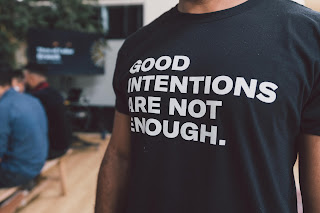Becoming anti-racist or an ally of differently abled persons is an ongoing learning and growth process. One action you can take is to build skills to interrupt biases or stereotypes when you see them. Interruptions are often an attempt to stop a present or future harmful behavior, model respectful words and actions, create a safe space, advocate for those oppressed by the behavior, and support those being harmed. Interrupting oppressive and biased actions and words is a form of allyship. It shows you care and want people to be safe.
Youth workers can role model interrupting biases as well as teach skills to interrupt. Two resources I have found helpful in increasing my skills in this area are Speak Up at School by Learning for Justice, and Toolkit for Interrupting Oppression by the Oregon Coalition Against Domestic and Sexual Violence.
The Speak Up at School guide gives these strategies to use in the moment when harmful words or actions are taking place:
- Interrupt. Speak up against every biased remark or action.
- Question. Use simple, exploratory questions such as, "Why do you say that?" "What do you mean?" or "Tell me more."
- Educate. Explain why the term or phrase is offensive.
- Echo. Be the second or third person to speak up.
I have found helpful examples of possible interruptions from the Interrupting Oppression Toolkit. Here are a few I have used:
- Ask for clarity. "By 'crazy' do you mean awesome? Unexpected? Wrong?"
- Voice your values. "Please refrain from using ableist language like dumb and lame."
- Appeal to a sense of shared humanity. "How would that person or someone from that group feel if they heard you?"
- Fall back on rules or policies. "This is a place where it is not ok to use violent language."
I am still sometimes in shock and don’t say something when I hear biased language, but I am working on that and increasing the tools I have ready to interrupt. What phrases or tools do you use to interrupt bias?
-- Karyn Santl, Extension educator
You are welcome to comment on this blog post. We encourage civil discourse, including spirited disagreement. We will delete comments that contain profanity, pornography or hate speech--any remarks that attack or demean people because of their sex, race, ethnic group, etc.--as well as spam.

Thanks for this article and for offering specific language when all of us - youth AND adults - find ourselves in these situations. I appreciate that you shared your experience of being in shock sometimes, because I feel that way too! In the moment, the body registers that what was just said is not okay, but our verbal skills are not quite there yet - especially if we live in a culture where speaking out is considered negative or "rocking the boat." Some language I might use in that moment could be: "Wow! That felt uncomfortable." or "Whew! What you said just isn't landing right for me. I feel tense." or "I just felt something zing through me when you said that." Or something like that. Basically - naming what I'm feeling in my body.
ReplyDeleteThanks Kim! I appreciate your tip of stating what your body is feeling when you hear bias or stereotype language. That is a good strategy to use.
ReplyDeleteThanks for offering this very concrete summary of some of these great tools, Karyn. They are so important in our world and especially in our youth programs. The more we can role model active engagement in the face of bias, the better equipped our youth will be to pick up and go beyond where we go. I am always stunned and heartbroken when I hear stories from youth about biased incidents that occurred where adults clearly witnessed them and did not intervene. Given that keeping kids safe (emotionally as well as physically) is our baseline responsibility, this is a great place to start with addressing biased behavior whether in youth or adults.
ReplyDeleteThank you Kathryn. Yes, it is heartbreaking when we hear stories of youth not feeling safe when adults could have made a difference. The two tools I mentioned can give us (adults) the tools and knowledge to interrupt bias and then role modeling for youth.
DeleteThanks for this thought-provoking post, Karyn. I so appreciate the resources shared, especially the Toolkit for Interrupting Oppression. I love that you identified the many different reasons we strive to interrupt bias: stopping harmful behavior, modeling respect, etc. As youth workers, we all relate to the desire to demonstrate care and create safer environments for young people and volunteers. Your suggestions help us take the steps we need to lead/faciliate with those goals in mind. Your "echo" recommendation is standing out to me. Being the target of a harmful racist or ableist comment is isolating and lonely. By naming and contending with the impact racist and ableist comments or behaviors we can repair and maintain that culture of caring.
ReplyDeleteThank you for commenting Marisa. Yes, I too like the "echo" recommendation and I think it is a great way for adults to model being an ally when we are the 2nd or 3rd voice to interrupt bias. As we speak up, so will youth.
Delete